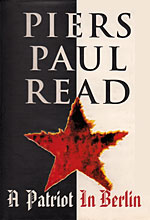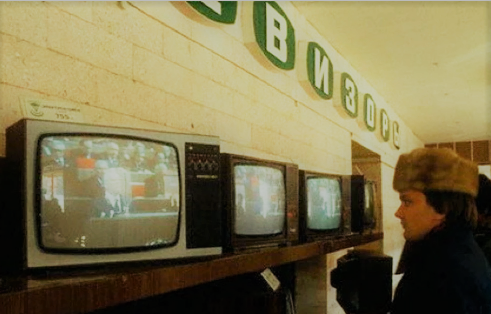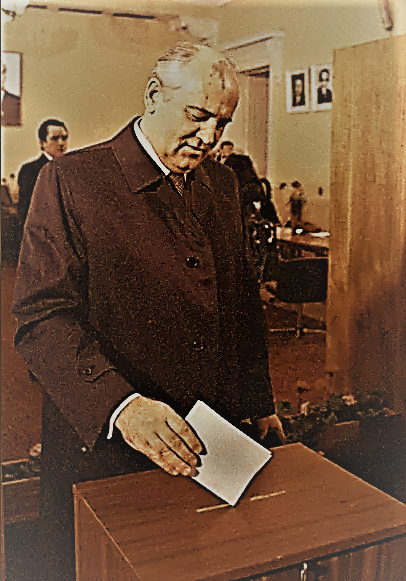Part one of this review is here
Part two of this review is here

A Patriot in Berlin makes an early attempt to explore what the collapse of Communism in 1989-91 means. Is it the failure of a Marxist ideal and the triumph of capitalism? Is it the replacement of internationalism by old-fashioned nationalism? Is it the persistence of religious faith in the face of empty atheism?
Piers Paul Read sets out such distinctions, at the same time as refusing to buy into simplistic binary choices. He draws the Orthodox Christian and the Marxist-Leninist as characters with a number of beliefs in common. They share their measure of nationalism, anti-Westernism, and anti-materialism. Do these positions stem from being Russian rather than from adhering to some wider framework? At the same time though, the novel as a whole explores differences between the Christian and the Communist worldview.
The question arises too of the relationship between faith —be it Communist or Orthodox— and the alleged materialism of the West. Russian security officer Gerasimov, whose aim throughout the novel is to get hold of scarce western goods, has disdain for the Orthodox wife of the man for whom he is searching
[her] room lacked any of the luxuries that Gerasimov would esteem —a colour television, a video recorder, a compact disc player— but had an old oak wardrobe, a table covered with a silk cloth, a huge old samovar: all things from before the Revolution, antiques like her beliefs
a patriot in berlin, p. 88
It reminds me of Francis Fukuyama’s pithy conceptualisation of the post-Communist future set out in The End of History: easy access to VCRs and stereos.

Again though, in A Patriot in Berlin there is deliberate ambiguity as to whether disdain for materialism is a matter of religious faith, Communist ideology, or innate Russian-ness. The materialist Gerasimov, in a manner widely assumed by Westerners to be ubiquitous amongst Russia’s Levi-starved citizens in the late Soviet period, equates everything desirable with the West.
A well-drawn scene has Gerasimov finally getting his posting to Berlin and seeking out a German woman for a one-night stand. The woman he finds turns out to be a prostitute —well that is OK with Gerasimov; he copes with that and pays his money. Despair only arrives when, at the moment of climax, she reveals herself to be Russian:
Her eyes became bleary, her murmuring became groans, her groans, gasps, until finally involuntary cries came from her mouth —yes, yes, yes, ja, ja, ja; or was it — he could not believe it — not ja, ja, ja but da, da, da!
… Gerasimov groaned and hid his face in the pillow.
A patriot in berlin, p. 195
Exploring further the theme of Russian-ness, materialism and faith in either Christianity or Marxism-Leninism, one of the staunch Communist characters, Perfilyev, is angrily dismissive of Americans as:
a nation of mongrels, the descendants of all the miscreants, malcontents and traitors who abandoned their native lands in the old world — sectarians like the Puritans and Quakers, greedy English colonists, slave-owners who preached liberty as an excuse to turn against their king; the runts in the litter of every slum in every minor nation from Latvia to Sicily, from Ireland to Greece. What is the driving spirit of every colonial culture? Greed! To hell with the people. Every man for himself …
Socialism suits the temperament of our people: they were always averse to capitalism of any kind. They resisted Stolypin’s reforms after 1905. They will resist Yeltsin’s now. Unless, of course, the so-called reforms are forced upon us by the Americans and the World Bank. Then, comrades, you have only to look south over the border to see what the future holds. Look at Turkey, a once great empire reduced to the condition of a third-rate power, its people transported to Germany to provide cheap labour for Krupp and Thyssen on the Ruhr
A patriot in berlin, pp. 101-102
When challenged that there are Russian workers who would be very happy to work for Krupp and Thyssen, Perfilyev angrily responds
Of course … because they are enticed by the thought of riches, and imagine that the higher their standard of living, the happier they will be. But there are some things that matter more than money, Comrade Major. Justice. Dignity. Honour. We may have been poor under Brezhnev. There may have been cases of corruption. But what comparable country was better off?
A patriot in berlin, p. 102
The closing phrase in this exchange is a despairing, melancholy
You can’t imagine what it’s like back in Moscow, Comrade Colonel. Anyone will do anything for dollars.
A patriot in berlin, p. 103
And what is it like back in Moscow?

In an accurate description of public attitudes amongst the older generation in particular, there is not exactly wild rejoicing over the freedoms of democracy.
The words of one such older Russian illustrate
Damn it, there were no politicians in the Soviet Union before Mikhail Sergeyevich had those damned elections in ‘eighty-nine. Elections! A beauty contest among weasels!
a patriot in berlin, p. 148
A Patriot in Berlin is a thoughtful novel that takes some of the features of a standard thriller and deploys them to push the reader on through an exploration of that ideologically raw time in the immediate aftermath of the Communist collapse. From this distance, the ideas and assumptions in the mouths of the representative characters seem rather naïve in the light of what was to come.
But for Russian in Fiction, all that is part of the attraction of A Patriot in Berlin. It is so much of the early 1990s in a way that takes the reader back to the ideas, the hopes, and the behaviours of those unique and highly distinctive years.
Part one of this review is here
Part two of this review is here